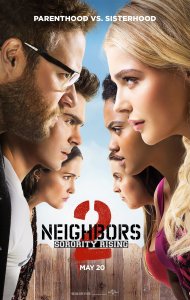 You could be forgiven for calling “Neighbors 2: Sorority Rising” the most feminist movie of the year. Such is the state of Hollywood movies when there are so few truly female-fronted blockbusters and comedies that a movie in which teenage girls chuck their bloody tampons into Seth Rogen’s mouth could be considered progressive. But whether or not Rogen and company have made a feminist raunch-fest, they’ve made an often hilarious sequel that at least begs the question.
You could be forgiven for calling “Neighbors 2: Sorority Rising” the most feminist movie of the year. Such is the state of Hollywood movies when there are so few truly female-fronted blockbusters and comedies that a movie in which teenage girls chuck their bloody tampons into Seth Rogen’s mouth could be considered progressive. But whether or not Rogen and company have made a feminist raunch-fest, they’ve made an often hilarious sequel that at least begs the question.
“I don’t even know what’s sexist,” Rogen’s character says in desperation at one point in “Neighbors 2.” Director Nicholas Stoller could be breaking boundaries or crossing serious lines, but at the end of the day he’s trying to make a funny movie. The divide between sharp political satire and what could be considered offensive and insensitive is often blurry.
Here’s the ugly truth that “Neighbors 2” brings to light: sororities on American campuses are not allowed to throw parties, but frats can. Stoller perfectly captures modern Greek life in a quick early scene, with Selena Gomez leading a flock of girls all dressed in white while wearing halos made of flowers. Their delicate golf claps say it all. Shelby, Beth and Nora (Chloe Graec Moretz, Kiersey Clemons, Beanie Feldstein) together reject this culture and decide that instead of rushing a sorority where they can’t smoke weed and where frat houses literally have “giant arrows pointing upstairs to fuck us,” they’ll start their own sorority, right next door to Mac and Kelly Radner (Rogen and Rose Byrne).
Time and again the movie reminds us that if a man were doing the crazy, vulgar, potty and drug humor that happens here, no one would bat an eye. To be fair, “Neighbors 2” may be pushing its luck; “Bridesmaids” never had to tell the audience how forward thinking it was to have women acting filthy. But Stoller is smart enough to wink at the audience in that, like in the original “Neighbors,” both the Radners and the college kids next door are man-sized children not nearly as mature as they pretend to be.
“Neighbors” was a riot because it flipped the script of what a crazy frat bro could look like in creative ways, and the sequel has more of the same. Zac Efron returns to continue spending the bulk of his time shirtless, even briefly turning into Magic Mike, but at the same time he and his brothers will pull out a ukulele and sing Jason Mraz during a gay wedding proposal. This movie could arguably be as queer as it is feminist.
What’s new has all to do with the girls. They dress like Minions as a form of hazing. They watch “The Fault in Our Stars” all together in their pajamas. They dress up like feminist icons Oprah and First Lady Hillary Clinton, Senator Hillary Clinton, and future President Hillary Clinton. Five dudes may have written the screenplay, but it feels like comedy for women, not just gross-out comedy performed by women.
“Neighbors 2” doesn’t gel quite as well as the original, but it has equal doses of Rogen and Byrne’s dopey chemistry, not to mention some impressively funny cinematic style. Stoller can stage a pretty solid pratfall, and there’s one hilarious sequence where Rogen and Efron, each shirtless and jiggling, are running through a hazy orange fog as “Sabotage” plays in the background. It would be funny even if they weren’t being chased by teenage girls trying to steal back their trash bag full of weed.
So whether “Neighbors 2” is feminist is beside the point. Stoller’s having a lot of fun, and the girls will too.
3 ½ stars
